教版八年级上册英语第九单元知识点总结
人教版英语八年级上第九单元知识点

Unit 9 Can you come to my party?一、单词及短语1、prepare 动词意为使…做好准备,把…准备好;常用短语①prepare for……为…做准备;其名词形式是preparation 意为准备,准备工作Eg:I can’t go to your party ,because I must prepare for the math exam.The farmers are preparing the ground for planting。
农民们正在为种植准备耕地。
②prepare sb for/to do sth 使某人对……做好准备eg:The teachers are preparing the students for the final examination.老师们正让学生们准备期末考试.He took out a picec of paper and prepared to write to his friend.他拿出一张纸,准备给他的朋友写信。
③prepare sb sth 为某人准备……eg:the host prepared us a delicious meal.主人为我们准备了美味的晚餐.2、exam examination 名词意为考试常见的短语:entrance exam 入学考试pass the exam 通过考试fail the exam 考试及格have /take an exam 参加考试3、have the flu 患感冒have a cold 感冒了have a fever 发高烧have a headache 头痛注意:其中的have不是有的意思,通常意为患有……4、available 形容词意为有空的;可获得的,和free的意义相同be available===be freeEg:I am available (free)in this afternoon. 下午有空。
八年级英语上册 unit 9 when was he born知识点总结 人教新目标版
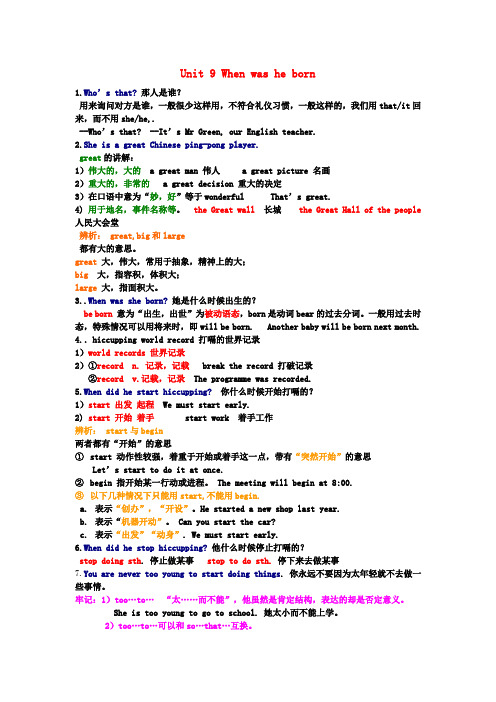
Unit 9 When was he born1.Who’s that?那人是谁?用来询问对方是谁,一般很少这样用,不符合礼仪习惯,一般这样的,我们用that/it回来,而不用she/he,.--Who’s that? --It’s Mr Green, our English teacher.2.She is a great Chinese ping-pong player.great的讲解:1)伟大的,大的 a great man 伟人 a great picture 名画2)重大的,非常的 a great decision 重大的决定3)在口语中意为“妙,好”等于wonderful That’s great.4) 用于地名,事件名称等。
the Great wall长城the Great Hall of the people 人民大会堂辨析: great,big和large都有大的意思。
great 大,伟大,常用于抽象,精神上的大;big大,指容积,体积大;large大,指面积大。
3..When was she born?她是什么时候出生的?be born意为“出生,出世”为被动语态,born是动词bear的过去分词。
一般用过去时态,特殊情况可以用将来时,即will be born. Another baby will be born next month.4..hiccupping world record 打嗝的世界记录1)world records 世界记录2)①record n. 记录,记载 break the record 打破记录②record v.记载,记录 The programme was recorded.5.When did he start hiccupping?你什么时候开始打嗝的?1)start 出发起程 We must start early.2) start 开始着手 start work 着手工作辨析: start与begin两者都有“开始”的意思①start 动作性较强,着重于开始或着手这一点,带有“突然开始”的意思Let’s start to do it at once.②begin 指开始某一行动或进程。
八年级上册英语第九单元知识点

八年级上册英语第九单元知识点(经典版)编制人:__________________审核人:__________________审批人:__________________编制单位:__________________编制时间:____年____月____日序言下载提示:该文档是本店铺精心编制而成的,希望大家下载后,能够帮助大家解决实际问题。
文档下载后可定制修改,请根据实际需要进行调整和使用,谢谢!并且,本店铺为大家提供各种类型的经典范文,如工作报告、工作计划、活动方案、规章制度、演讲致辞、合同协议、条据文书、教学资料、作文大全、其他范文等等,想了解不同范文格式和写法,敬请关注!Download tips: This document is carefully compiled by this editor. I hope that after you download it, it can help you solve practical problems. The document can be customized and modified after downloading, please adjust and use it according to actual needs, thank you!Moreover, our store provides various types of classic sample essays, such as work reports, work plans, activity plans, rules and regulations, speeches, contract agreements, documentary evidence, teaching materials, complete essays, and other sample essays. If you would like to learn about different sample formats and writing methods, please pay attention!八年级上册英语第九单元知识点八年级上册英语第九单元知识点笔记掌握英文语法和单词是学好英语的基础,可以通过背诵单词和语法知识来达到这个目的,平时学习的知识点也需要格外注意!以下是本店铺为大家带来的八年级上册英语第九单元知识点笔记,欢迎参阅呀!八年级上册英语第九单元知识点笔记连接代词和连接副词引导的宾语从句。
人教版初中英语八上unit9知识点
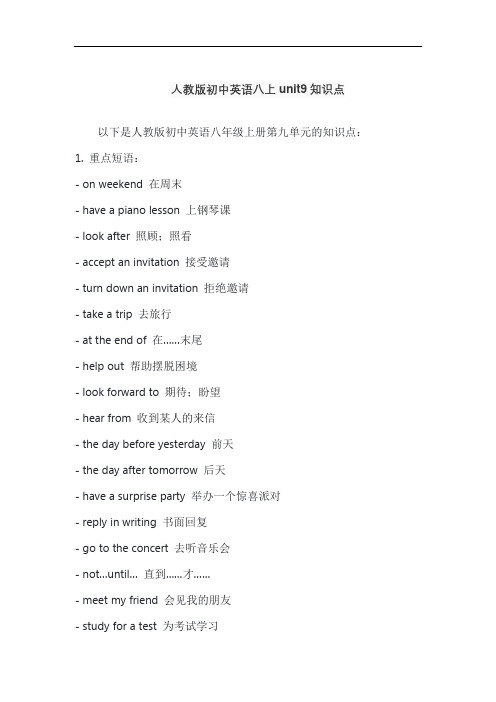
人教版初中英语八上unit9知识点以下是人教版初中英语八年级上册第九单元的知识点:1. 重点短语:- on weekend 在周末- have a piano lesson 上钢琴课- look after 照顾;照看- accept an invitation 接受邀请- turn down an invitation 拒绝邀请- take a trip 去旅行- at the end of 在……末尾- help out 帮助摆脱困境- look forward to 期待;盼望- hear from 收到某人的来信- the day before yesterday 前天- the day after tomorrow 后天- have a surprise party 举办一个惊喜派对- reply in writing 书面回复- go to the concert 去听音乐会- not…until… 直到……才……- meet my friend 会见我的朋友- study for a test 为考试学习2. 重点语法:- 用can 来表达邀请- Can you come to my party on Saturday?- Sure, I'd love to.- Sorry, I can't. I have to prepare for an exam.- 用must 来谈论职责和义务- I must finish my homework first.- I have to look after my sister.- 用might 来表示可能性- He might come to the party.- She might not be able to come.3. 重点句型:- Can you come to my party? 你能来参加我的聚会吗?- I'd love to, but I'm afraid I can't. 我很愿意,但恐怕不能。
人教版丨八年级上册英语9单元知识点梳理

人教版丨八年级上册英语9单元知识点梳理人教版丨八年级上册英语9单元知识点梳理Unit 9 When was he born?一、词组ping-pong player 乒乓球运动员too…to…太….而不能…a great Chinese ping-pong player 中国杰出的乒乓球运动员start hiccupping 开始打嗝write music 谱写曲子a movie star 电影明星learn to ride a bicycle 学会骑自行车start learning 开始学英语begin playing sports 开始进行体育运动a loving grandfather 慈爱的祖父a famous violinist 著名的小提琴手spend all one’s free time with sb. 与某人一起度过了所有的业余时间ice skating 滑冰a kind and loving grandmother 和蔼而慈爱的祖母a skating champion 滑冰冠军a small boy(girl) 孩提时期the famous Chinese pianist 中国著名的钢琴演奏家at the age of…在…年龄时take part in 参加、加入begin to learn the accordion 开始学习手风琴major in 主修,专修because of 因为、由于start for a place=leave for a place 动身去…二、词汇精讲1、be bornbe born意为“出生”,born是动词bear的过去分词,它与be 构成系表结构be born,常用在一般过去时,也可用于一般将来时中。
When was he born? 他是什么时候出生的?Another baby will be born next month. 另一个婴儿将于下个月出生。
人教版八年级上册英语-Unit-9单元知识点总结
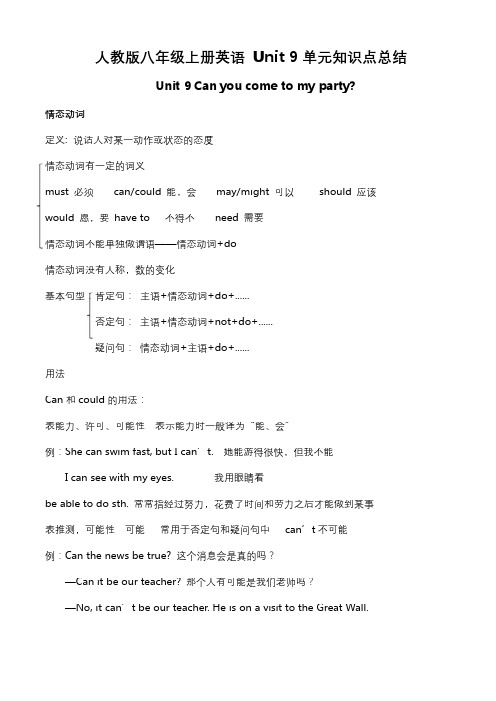
Unit 9 Can you come to my party? 情态动词定义: 说话人对某一动作或状态的态度情态动词有一定的词义must 必须can/could 能,会may/might 可以need 需要should 应该would 愿,要have to 不得不情态动词不能单独做谓语——情态动词+do情态动词没有人称,数的变化基本句型:肯定句:主语+情态动词+do+......否定句:主语+情态动词+not+do+......疑问句:情态动词+主语+do+......用法Can 和 could 的用法:表能力、许可、可能性表示能力时一般译为“能、会”例:She can swim fast, but I can’t.她能游得很快,但我不能I can see with my eyes. 我用眼睛看be able to do sth. 常常指经过努力,花费了时间和劳力之后才能做到某事表推测,可能性可能常用于否定句和疑问句中can’t不可能例:Can the news be true? 这个消息会是真的吗?—Can it be our teacher? 那个人有可能是我们老师吗?—No, it can’t be our teacher. He is on a visit to the Great Wall.could 在疑问句中,表示委婉的语气,此时could 没有过去式的意思例:—Could I use your pen? 我能用一下你的钢笔吗?—Yes, you can.可以(用 could 问,不能用 could 答。
)may 和 might 的用法表请求、许可,比 can 正式例:May I borrow your bike? 我可以借你的自行车吗?You may go home now. 现在你可以回家了表推测,谈论可能性可能,或许一般用于肯定句中may not 翻译为“可能不”例:It may rain tomorrow. 明天可能会下雨She may be at home. 她可能在家呢may 的过去式为 might ,表示推测时。
八年级英语u9知识点
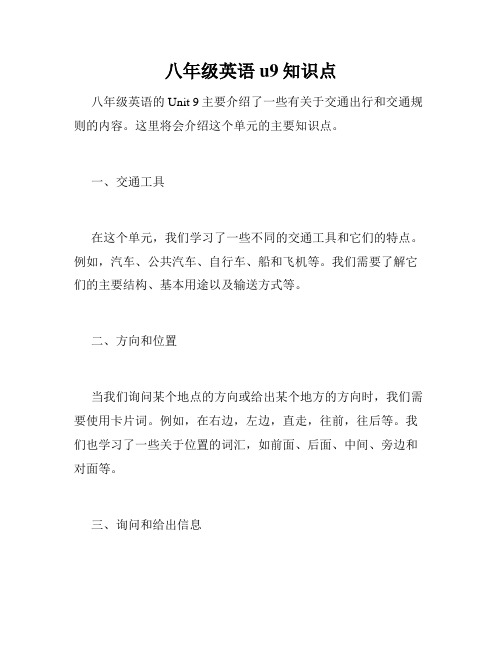
八年级英语u9知识点
八年级英语的Unit 9主要介绍了一些有关于交通出行和交通规则的内容。
这里将会介绍这个单元的主要知识点。
一、交通工具
在这个单元,我们学习了一些不同的交通工具和它们的特点。
例如,汽车、公共汽车、自行车、船和飞机等。
我们需要了解它们的主要结构、基本用途以及输送方式等。
二、方向和位置
当我们询问某个地点的方向或给出某个地方的方向时,我们需要使用卡片词。
例如,在右边,左边,直走,往前,往后等。
我们也学习了一些关于位置的词汇,如前面、后面、中间、旁边和对面等。
三、询问和给出信息
在交通出行中,询问方向、地点和其他相关信息非常重要。
因此,在这个单元,我们学习了一些有关如何有效地进行信息交流
的语言表达方法。
例如,如何向他人提问和回答问题,如何描述
位置,如何提供和请求帮助等。
四、指示词和冠词
在描述交通工具、位置和方向时,我们需要使用指示词和冠词。
这些词语能够帮助我们更清楚地表达意思,如this、that、these、those、a、an和the等。
五、交通规则
学习关于交通规则是出现意外事故和确保人身安全的关键。
在
这个单元里,我们学习了一些常见的交通规则,如穿过马路时如
何确保自己的安全,如何识别交通标记等等。
总结
通过学习这个单元,我们可以更好地了解有关交通出行及其相关信息的表达方法,同时学习了如何提供和请求帮助,如何保障自己的人身安全以及关于交通规则的知识。
这些知识点不仅适用于英语学习,也将对我们的日常生活有所帮助。
八年级英语上册第九单元重要知识点汇总(人教版)

八年级英语上册第九单元重要知识点汇总(人教版)八年级英语上册第九单元重要知识点汇总(人教版)短语:n Saturda afternn have t prepare fr g t the dtrhave the flu help parents e t the part eet friendg t the part t uh her g t the vies anther tielast fall hang ut after shl n the eeend stud fr a testvisit grandparents the da befre esterda the da after trrhave a pian lessn l after aept an invitatin turn dn an invitatintae a trip at the end f this nth l frard tthe pening frepl in riting g shpping d her g t the nertn t…until短语用法:invite sb t d sth hat + a/an + 形容词+ 可数名词单数(+ 主语+ 谓语)!help sb (t) d sth hat + 形容词+ 名词复数/不可数名词(+ 主语+ 谓语)!be sad t d sth see sb t d sth / see sb ding sththe best a t d sth have a surprise part fr sbl frard t ding sth repl t sth/sbhat’s tda? hat’s the date tda? hat da is it tda?句型:an u e t part n Saturda afternn?Sure, I’d lve t / Srr,I an’t I have t prepare fr an exa语法:an u e t part n Saturda? Sure, I’d lve t /Srr, I ust stud fr a ath testan u g t the vie trr Sure That sund great / I’afraid nt I have the flu night?an he g t the part? N, he an’t He has t help his parentsan she g t the baseball gae? N, she’s nt available She ust g t the dtr an the g t the vie? N, the’re nt free The ight have t eet their friends1 prepare意为“准备”,强调准备的动作与过程。
八年级英语上册Unit9Canyouetomyparty知识点归纳(新版)

Unit9 Can you e to my party?短语:1.on Saturday afternoon在周六下午2.prepare for为……做准备prepare to do sth 准备做某事3.go to the doctor去看医生4.have the flu患感冒5.help my parents帮助我的父母6.e to the party来参加聚会7.meet my friend会见我的朋友8..another time其他时间st fall=last autumn去年秋天10.go to the party去聚会11.hang out with sb 和某人一起闲逛12.the day after tomorrow后天the day before yesterday前天13.have a piano lesson上钢琴课14.accept an invitaton接受邀请14.turn down an invitation拒绝邀请15.look for寻找look after=take care of照顾16.take a trip去旅行17 at the end of this month这个月末 18.lookforward to doing盼望;期待19.the opening of… ……的开幕式/落成典礼 20.reply in writing书面回复21.go to the concert去听音乐会not…until直到……才22.too much homework太多作业do homework做家庭作业23.after school放学后24.help out分担工作,解决难题25,hear from sb 收到某人的来信26.any of the party preparations派对准备中的任何事用法:1.invite sb. to do sth.邀请某人做某事invite sb to sp 邀请某人去某地2.what引导的感叹句结构:What+a/an+adj.+可数名词单数(+主语+谓语)!What+adj.+名词复数/不可数名词(+主语+谓语)!5.see sb. do sth. see sb.doing sth.10.What’s today?今天是什么日子?What’s the date today?今天几号?What day is it today?今天星期几?11.Thanks for asking= Thanks for inviting = Thanks for your invitantion谢谢你的邀请12.refuse to do sth 拒绝做某事。
人教版初中英语八年级上册单元9+10知识点、语法归纳整理
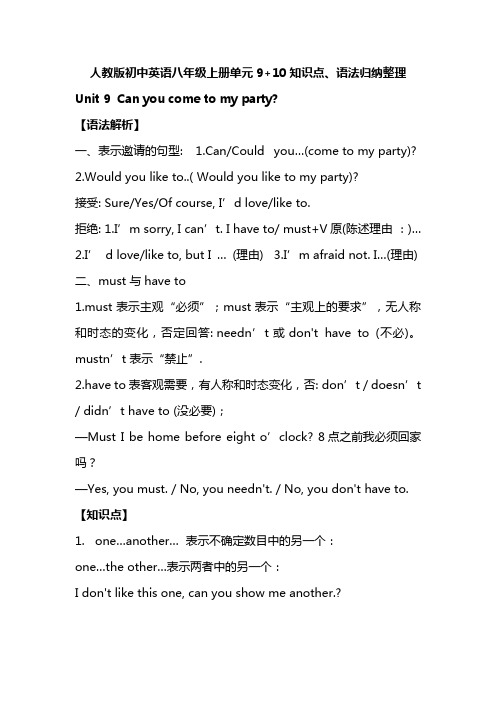
人教版初中英语八年级上册单元9+10知识点、语法归纳整理Unit 9 Can you come to my party?【语法解析】一、表示邀请的句型: 1.Can/Could you…(come to my party)?2.Would you like to..( Would you like to my party)?接受: Sure/Yes/Of course, I’d love/like to.拒绝: 1.I’m sorry, I can’t. I have to/ must+V原(陈述理由:)…2.I’d love/like to, but I …(理由)3.I’m afraid not. I…(理由)二、must 与have to1.must 表示主观“必须”;must 表示“主观上的要求”,无人称和时态的变化,否定回答: needn’t 或 don't have to (不必)。
mustn’t 表示“禁止”.2.have to表客观需要,有人称和时态变化,否: don’t / doesn’t / didn’t have to (没必要);—Must I be home before eight o’clock? 8点之前我必须回家吗?—Yes, you must. / No, you needn't. / No, you don't have to. 【知识点】1. one…another…表示不确定数目中的另一个:one…the other…表示两者中的另一个:I don't like this one, can you show me another.?I have two brothers. One is a lawyer and the other is a manager.some…others…表示没有范围限定的“一些…另一些…”some…the others…表示某一范围的“一些…其余的…”Some go to school by bike and others go to school by bus. Some go to school by bike and the others go to school by bus. 注:other+名词=others 其他的(人/物)2. invite v.邀请名词是invitationinvite sb. to do sth.“邀请某人干某事” invite sb. to+地点名词1). Mr. Green invited me to visit (visit) his factory last week.2). Thanks a lot for your invitation (invite).3).Thanks for inviting (invite) me to your party.3.(1)What’s today?问今天是几号、星期几,回答时,通常用星期和日期,也可用节日。
八年级上人教unit9知识点
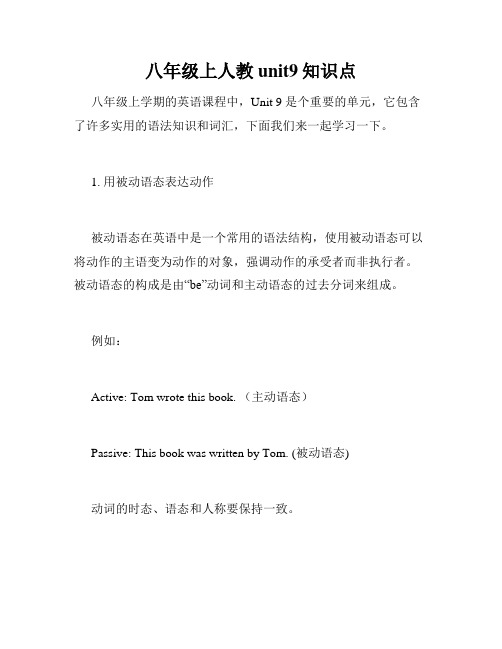
八年级上人教unit9知识点八年级上学期的英语课程中,Unit 9 是个重要的单元,它包含了许多实用的语法知识和词汇,下面我们来一起学习一下。
1. 用被动语态表达动作被动语态在英语中是一个常用的语法结构,使用被动语态可以将动作的主语变为动作的对象,强调动作的承受者而非执行者。
被动语态的构成是由“be”动词和主动语态的过去分词来组成。
例如:Active: Tom wrote this book. (主动语态)Passive: This book was written by Tom. (被动语态)动词的时态、语态和人称要保持一致。
被动语态可以用于各种类型的句子中,如陈述句、疑问句、祈使句等。
2. 用情态动词表达建议和推测情态动词在英语中是表示情态和语气的动词,可以用于表达建议、命令、愿望、推测等等。
建议:should / ought to / had better例如:You should / ought to study harder if you want to get into a good college.你如果想进好大学,应该更努力学习。
You had better not be late for the party tonight.今晚出去玩不能迟到。
推测:might / may / could例如:He might / may / could be at home. 我猜他可能在家。
She might / may / could have lost her phone. 她可能把手机弄丢了。
情态动词也可以用于否定句和疑问句中。
3. 介词短语的用法介词是一个关键词汇,用于表示事物之间的关系,如时间、地点、方向、方式、材料等。
介词短语对于英语语句的完整性和准确性起着非常重要的作用。
例如:He is sitting at the desk. 他坐在桌子旁边。
They are going to the cinema. 他们去电影院。
八年级上册英语unit9重要知识点

八年级上册英语unit9重要知识点八年级上册英语Unit 9重要知识点本文将为大家介绍八年级上册英语Unit 9的重要知识点,包括单词、语法、听力技巧和写作技巧等方面。
希望能为大家的学习提供帮助。
一、单词1. purchase:购买2. discount:折扣3. receipt:收据4. customer:顾客5. service:服务6. refund:退款7. guarantee:保证8. complain:投诉9. exchange:交换10. recommend:推荐以上是Unit 9中较为重要的单词,大家可以通过记忆卡片、词汇表等方式进行练习。
二、语法1. 区别must, may, mightUnit 9中,我们将学到情态动词must、may、might的用法。
大家需要了解它们之间的区别,例如:Must表示一定,必须的意思,例如:We must clean out the garage this weekend.(这个周末我们必须清理车库)May表示可能,可能发生的意思,例如:He may arrive late.(他可能会来晚一点)Might表示可能,有可能的意思,但比may的可能性更小,例如:I might be able to help you.(我可能能帮你)2. 区别realize和recognizeRealize和recognize都是“意识到”的意思,但它们的用法不同。
Realize后接具体的事物,例如:I realized that I had left my phone at home.(我意识到我把手机落在了家里)Recognize是更常用的词,它与remember不同,能表示重新认出或重新确定一个人或物。
例如:I didn't recognize her at first because she had dyed her hair.(一开始我没认出她,因为她把头发染了)三、听力技巧1. 在听力材料播放前,先认真阅读题目在做Listening部分的时候,建议大家在听力材料放出之前,先仔细阅读题目与选项。
八年级上册英语unit9知识点整理
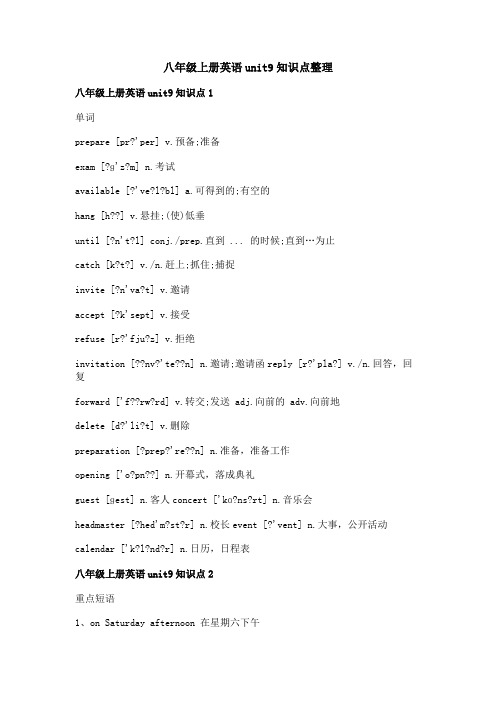
八年级上册英语unit9知识点整理八年级上册英语unit9知识点1单词prepare [pr?'per] v.预备;准备exam [?ɡ'z?m] n.考试available [?'ve?l?bl] a.可得到的;有空的hang [h??] v.悬挂;(使)低垂until [?n't?l] conj./prep.直到 ... 的时候;直到…为止catch [k?t?] v./n.赶上;抓住;捕捉invite [?n'va?t] v.邀请accept [?k'sept] v.接受refuse [r?'fju?z] v.拒绝invitation [??nv?'te??n] n.邀请;邀请函reply [r?'pla?] v./n.回答,回复forward ['f??rw?rd] v.转交;发送 adj.向前的 adv.向前地delete [d?'li?t] v.删除preparation [?prep?'re??n] n.准备,准备工作opening ['o?pn??] n.开幕式,落成典礼guest [ɡest] n.客人concert ['kɑ?ns?rt] n.音乐会headmaster [?hed'm?st?r] n.校长event [?'vent] n.大事,公开活动calendar ['k?l?nd?r] n.日历,日程表八年级上册英语unit9知识点2重点短语1、on Saturday afternoon 在星期六下午2、have to 必须3、 prepare for 准备4、go to the doctor 去看病5、have the flu 患流感6、help my parents 给父母帮忙7、come to the party 参加晚会8、meet my friend 见朋友9、go to the party 参加晚会10、too much homework 太多的家庭作业11、go to the movies 去看电影12、another time 下次,另外的时间,别的时间13、last fall 去年秋天14、hang out 闲逛15、after school 放学后16、on the weekend=on weekends 在周末17、study for a test 备考18、visit grandparents 拜访爷爷奶奶19、the day before yesterday 前天20、the day after tomorrow 后天21、have a piano lesson 上钢琴课22、look after 照看23 make an invitation 制定邀请24、accept an invitation 接受邀请 turn down (refuse) an invitation 拒绝邀请25、take a trip to Wuhan 去武汉旅游26、at the end of this month 在本月底27、look forward to + doing 期望/渴望28、the opening of… 开幕/开业29、reply in writing 写回信30、go shopping 购物31、do homework 做作业32、go to the concert 参加音乐会33、not…until… 直到......才......八年级上册英语unit9知识点3重点句型1. --Can you come to my party on Saturday afternoon? 星期六下午你能参加我的晚会吗? --Sure, I’d love to. / Sorry,I can’t. I have to prepare for an exam. 当然,我愿意去。
八年级上册unit9英语知识点

八年级上册unit9英语知识点Unit 9是八年级上册英语中的重点单元之一,主要涉及动词的时态、比较级和最高级、情态动词、被动语态等知识点。
本文将为大家详细讲解这些知识点。
1. 时态在Unit 9中,涉及的时态包括一般现在时、一般过去时、现在进行时、过去进行时和一般将来时等常见时态。
一般现在时表示现在经常或习惯性的动作或状态,它的构成为主语 + 动词原形。
例如:I usually play football after school.一般过去时表示过去某一时刻或一段时间内发生的动作或状态,它的构成为主语 + 动词的过去式。
例如:I went to the cinema last night.现在进行时表示正在进行的动作,它的构成为主语 + am/is/are+ 动词 + -ing。
例如:He is watching TV now.过去进行时表示过去某一时刻正在进行的动作,它的构成为主语 + was/were + 动词 + -ing。
例如:I was sleeping when you called me.一般将来时表示将来将要发生的动作或状态,它的构成为主语+ will + 动词原形。
例如:I will visit my grandparents next weekend.2. 比较级和最高级在Unit 9中,我们还需要掌握形容词和副词的比较级和最高级。
以英语中的形容词和副词为例,比较级和最高级的构成如下:形容词的比较级和最高级:比较级:原形 + -er,例如:bigger,more interesting.最高级:the + 原形 + -est,例如:the biggest,the most interesting.副词的比较级和最高级:比较级:原形 + -er,例如:faster,more quickly.最高级:the + 原形 + -est,例如:the fastest,the most quickly.需要注意的是,有些形容词和副词的比较级和最高级不是加 -er 或 -est,而是在前面加 more 或 most,例如:interesting,more interesting,the most interesting.3. 情态动词情态动词包括 can,could,may,might,will,would,shall,should,must,need,dare等,它们用来表示说话人的意愿、推测、建议等。
最全面人教版八年级上册英语第九单元知识点归纳总结
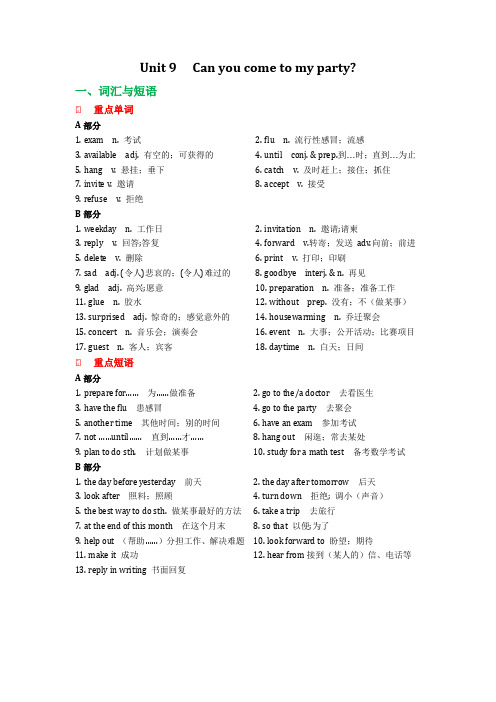
Unit 9 Can you come to my party?一、词汇与短语● 重点单词A部分1.exam n. 考试2.flu n. 流行性感冒;流感3.available adj. 有空的;可获得的4.until conj. & prep.到…时;直到…为止5.hang v. 悬挂;垂下6.catch v. 及时赶上;接住;抓住7.invite v. 邀请8.accept v. 接受9.refuse v. 拒绝B部分1.weekday n. 工作日2.invitation n. 邀请;请柬3.reply v. 回答;答复4.forward v.转寄;发送adv.向前;前进5.delete v. 删除6.print v. 打印;印刷7.sad adj. (令人)悲哀的;(令人)难过的8.goodbye interj. & n. 再见9.glad adj. 高兴;愿意10.preparation n. 准备;准备工作11.glue n. 胶水12.without prep. 没有;不(做某事)13.surprised adj. 惊奇的;感觉意外的14.housewarming n. 乔迁聚会15.concert n. 音乐会;演奏会16.event n. 大事;公开活动;比赛项目17.guest n. 客人;宾客18.daytime n. 白天;日间● 重点短语A部分1.prepare for…… 为……做准备2.go to the/a doctor 去看医生3.have the flu 患感冒4.go to the party 去聚会5.another time 其他时间;别的时间6.have an exam 参加考试7.not ……until…… 直到……才……8.hang out 闲逛;常去某处9.plan to do sth. 计划做某事10.study for a math test 备考数学考试B部分1.the day before yesterday 前天2.the day after tomorrow 后天3.look after 照料;照顾4.turn down 拒绝; 调小(声音)5.the best way to do sth. 做某事最好的方法6.take a trip 去旅行7.at the end of this month 在这个月末8.so that 以便;为了9.help out (帮助……)分担工作、解决难题10.look forward to 盼望;期待11.make it 成功12.hear from接到(某人的)信、电话等13.reply in writing 书面回复● 重点句子A部分1.--Can you come to my party on Saturday? --Sure, I'd love to.--周六你能来参加我的聚会吗?--当然,我想来。
英语八年级上九单元知识点
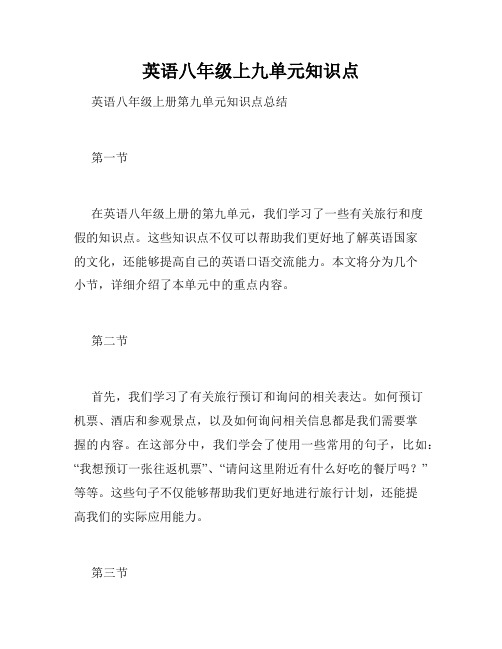
英语八年级上九单元知识点英语八年级上册第九单元知识点总结第一节在英语八年级上册的第九单元,我们学习了一些有关旅行和度假的知识点。
这些知识点不仅可以帮助我们更好地了解英语国家的文化,还能够提高自己的英语口语交流能力。
本文将分为几个小节,详细介绍了本单元中的重点内容。
第二节首先,我们学习了有关旅行预订和询问的相关表达。
如何预订机票、酒店和参观景点,以及如何询问相关信息都是我们需要掌握的内容。
在这部分中,我们学会了使用一些常用的句子,比如:“我想预订一张往返机票”、“请问这里附近有什么好吃的餐厅吗?”等等。
这些句子不仅能够帮助我们更好地进行旅行计划,还能提高我们的实际应用能力。
第三节其次,我们学习了如何描述景点和活动。
当我们在旅行中遇到一些美丽的景色或者有趣的活动时,我们需要用英语来进行描述。
比如,“这个地方有非常壮丽的风景”、“这个游乐园有很多刺激的项目”等等。
这部分的内容可以帮助我们更好地展示我们的英语口语表达能力,并且让我们在旅行中更好地与他人交流。
第四节接下来,我们学习了如何表达旅行中遇到的问题和解决办法。
在旅行中,我们难免会遇到一些问题,比如迷路、丢失物品等等。
这时候,我们需要学会如何用英语来表达问题,并且积极主动地寻找解决办法。
例如,我们可以说:“我迷路了,请问如何去最近的地铁站?”或者“我的手机丢了,我应该怎么办?”这些句子可以帮助我们更好地应对旅行中的问题,并且让我们更加自信地与他人交流。
第五节最后,我们学习了一些有关旅行中礼仪和文化的知识点。
在不同的国家,人们有不同的行为和言谈规范。
比如,我们要学会在不同国家用英语表达感谢和道歉,要了解一些当地的文化习俗,以便更好地融入当地的社会环境。
这部分内容不仅能够让我们更加了解世界,还能够培养我们的跨文化交流能力。
总结通过本九单元的学习,我们对旅行和度假有了更加深入的了解。
我们不仅学习了如何进行旅行预订和询问,还学习了如何描述景点和活动,解决旅行中遇到的问题,以及了解不同国家的文化习俗。
最全面人教版八年级上册英语第九单元知识点归纳总结

Unit 9 Can you come to my party?一、词汇与短语● 重点单词A部分1.exam n. 考试2.flu n. 流行性感冒;流感3.available adj. 有空的;可获得的4.until conj. & prep.到…时;直到…为止5.hang v. 悬挂;垂下6.catch v. 及时赶上;接住;抓住7.invite v. 邀请8.accept v. 接受9.refuse v. 拒绝B部分1.weekday n. 工作日2.invitation n. 邀请;请柬3.reply v. 回答;答复4.forward v.转寄;发送adv.向前;前进5.delete v. 删除6.print v. 打印;印刷7.sad adj. (令人)悲哀的;(令人)难过的8.goodbye interj. & n. 再见9.glad adj. 高兴;愿意10.preparation n. 准备;准备工作11.glue n. 胶水12.without prep. 没有;不(做某事)13.surprised adj. 惊奇的;感觉意外的14.housewarming n. 乔迁聚会15.concert n. 音乐会;演奏会16.event n. 大事;公开活动;比赛项目17.guest n. 客人;宾客18.daytime n. 白天;日间● 重点短语A部分1.prepare for…… 为……做准备2.go to the/a doctor 去看医生3.have the flu 患感冒4.go to the party 去聚会5.another time 其他时间;别的时间6.have an exam 参加考试7.not ……until…… 直到……才……8.hang out 闲逛;常去某处9.plan to do sth. 计划做某事10.study for a math test 备考数学考试B部分1.the day before yesterday 前天2.the day after tomorrow 后天3.look after 照料;照顾4.turn down 拒绝; 调小(声音)5.the best way to do sth. 做某事最好的方法6.take a trip 去旅行7.at the end of this month 在这个月末8.so that 以便;为了9.help out (帮助……)分担工作、解决难题10.look forward to 盼望;期待11.make it 成功12.hear from接到(某人的)信、电话等13.reply in writing 书面回复● 重点句子A部分1.--Can you come to my party on Saturday? --Sure, I'd love to.--周六你能来参加我的聚会吗?--当然,我想来。
- 1、下载文档前请自行甄别文档内容的完整性,平台不提供额外的编辑、内容补充、找答案等附加服务。
- 2、"仅部分预览"的文档,不可在线预览部分如存在完整性等问题,可反馈申请退款(可完整预览的文档不适用该条件!)。
- 3、如文档侵犯您的权益,请联系客服反馈,我们会尽快为您处理(人工客服工作时间:9:00-18:30)。
环球雅思教育学科教师讲义
副校长/组长签字:签字日期:
年级:八年级上课次数:
学员姓名:辅导科目:英语学科教师:课题Unit 9 Can you come to my party?
课型□预习课□同步课□复习课□习题课
授课日期及时段2014 年月日
教学目的
重难点
教学内容
Unit 9 Can you come to my party?
一、课本重要语法点梳理
一、词组、短语:
1、on Saturday afternoon 在星期六下午,
2、have to 必须,
3、prepare for 准备,
4、go to the doctor去看病,
5、have the flu 患流感,
6、help my parents给父母帮忙,
7、come to the party 参加晚会,
8、meet my friend见朋友,
9、go to the party 参加晚会,
10、too much homework 太多的家庭作业,
11、go to the movies去看电影,
12、another time下次,
13、last fall 去年秋天,
14、hang out 闲逛,
15、after school 放学后,
16、on the weekend 在周末,
17、study for a test备考,
18、visit grandparents 拜访爷爷奶奶,
19、the day before yesterday 前天,
20、the day after tomorrow后天,
21、have a piano lesson 上钢琴课,
22、look after 照看,
23、accept an invitation 接受邀请,
24、turn down an invitation拒绝邀请,
25、take a trip 参加郊游,
26、at the end of this month在本月底,
27、look forward to 期望/渴望,
28、the opening of…开幕/开业,
29、reply in writing 写回信,
30、go shopping 购物,
31、do homework 做作业,
32、go to the concert参加音乐会,
33、not…until 不…直到才
二、习惯用法、搭配
1、invite sb. to do sth.邀请某人做某事,
2、What a/an + 形容词+ 可数名词单数(+ 主语+ 谓语)!
3、help sb. (to) do sth 帮助某人做某事,
4、What + 形容词+ 名词复数/不可数名词(+ 主语+ 谓语)!
5、be sad to do sth. 做某事感到悲伤,
6、see sb to do sth /see sb doing sth看见某人做某事,
7、the best way to do sth.做某事的最好方法,
8、have a surprise party for sb为某人举办一个惊喜的晚会,
9、look forward to doing sth. 期望做某事,
10、reply to sth/sb.回答某人/回答某事,
11、What’s today? 今天星期几,几月几日?
12、What’s the date today?今天几月几日?
13、What day is it today?今天星期几?
三、重要句子:
1、Can you come to my party on Saturday afternoon?星期六下午你能参加我的晚会吗?
2、Sure, I’d love to. / Sorry,I can’t. I have to pre pare for an exam.
语法:
Can you come to my party on Saturday?
Sure, I’d love to. /Sorry, I must study for a math test.
Can you go to the movie tomorrow night?
Sure. That sound great. I’m afraid not. I have the flu.
Can he go to the party?
No, he can’t. He has to help his parents.
Can she go to the baseball game?
No, she’s not available. She must go to the doctor.
Can they go to the movie?
No, they’re not free. They might have to meet their friends.
四、词语辨析
1、prepare意为“准备”,强调准备的动作与过程。
宾语是这一动作的承受者。
其后也可接双宾语,还可接不定式。
prepare for sth. 为…准备好。
for的宾语不是动作的承受者,而是表示准备的目的,即所要应付的情况。
/ prepare to do sth 准备做某事。
prepare 强调准备的动作与过程。
宾语是这一动作的承受者。
其后也可接双宾语,还可接不定式。
get/be ready意为“准备好”,强调准备的结果。
常见结构有:①be ready(for sth.)②get sth. ready
③be ready(for sth)④be get ready to do(准备干某事,乐于干某事)
We _____ the mid-term examination. Miss Li said, “Everyone should ______before class.
2.have the flu 患感冒, have a cold 感冒,have a cough 咳嗽, have a fever 发烧, have a sore throat 喉咙痛, have
a headache 头痛,have a toothache 牙痛,
3. hang out 常去某处,泡在某处, hang on 紧紧抓住, hang about 闲荡, hang up 挂电话,悬挂,挂起
4. catch you =see you = bye bye ,catch a cold感冒, catch sb’s eye引起某人注意, catch the train 赶上火车catch up with =keep up with 赶上,跟上,catch hold of=take hold of 抓住
5.accept 接受, 反义词为:refuse。
accept指主观上愿意接受,receive 收到,指客观上收到或拿到,但主观上不一定会接受。
I received his gift yesterday, but I wouldn’t like to accept it.
1.turn down = refuse 拒绝turn up 放大,调高turn over 翻身take turns 依次,轮流
2.help sb.(to) do sth 帮助某人做某事help sb. with sth 在某方面帮助人help oneself to sth 随便吃
3.at the end of 在…末尾,在…尽头,by the end of 到…末为止in the end of 终于
4.surprised 形容词,感到意外的,主语是人be surprised to do sth 对做某事感到意外
surprising 形容词,令人惊讶的,主语是物The news was surpring.
surprise 名词,惊奇、惊讶to one’s surprise使某人吃惊,动词,使惊奇,使感到意外It surprise sb to do sth.
5.look forward to 期待,盼望,to 是介词,后跟名词,代词或动名词作宾语。
hear from sb. 收到某人的来信= receive a letter from sb.
hear of = hear about 听说
6.make it 在约定的时间内到达,能够来= arrive in time; Glad you could make it.
商量确定的时间,表示将来某项计划的安排,后接时间状语。
Let’s make it at seven o’clock on Tuesday.
成功办成某事= succeed After years of hard work, he finally made it.
7.reply 回答,指用口头或书面形式回答,不及物动词reply to sb/sth. 对…..作出回答。
作及物动词,意为回答,回答说。
作名词,意为:答道,回信,答复,后跟介词to .
answer 是最普通的用语,包括口头,书面或行动的回答,可作及物和不及物动词。
二、课堂练习及家庭作业见附件。
